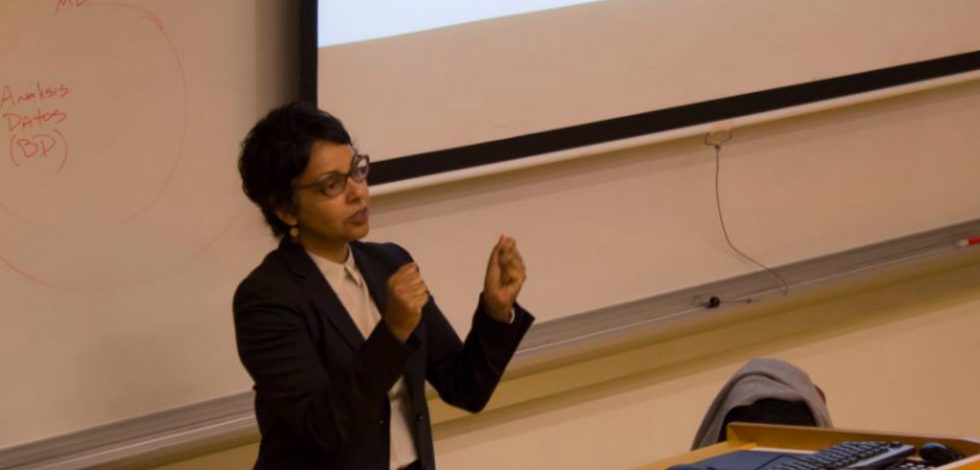
“Predictive Models of Risk for Vulnerated Children”, was the title of the keynote speech that Professor Rhema Vaithianathan, PhD in Economics and co-director of the Center for Social Data Analytics of Auckland University of Technology gave in the UAI invited by the Goblab UAI

Can you predict when a child is at risk?
May 25, 2018
“Predictive Models of Risk for Vulnerated Children” was the title of the keynote speech that Professor Rhema Vaithianathan, PhD in Economics and co-director of the Center for Social Data Analytics of Auckland University of Technology gave at the UAI invited by the Goblab UAI , the public innovation lab of the Government School.
For the director of the GobLab UAI, María Paz Hermosilla, the objective of this paper was that the researcher – who was accompanied by a PhD student working at her Center, Diana Benavides Prado -, could share her experience in the use of science of data to improve the design and management of public policies, specifically, the protection of infringed children.
Hermosilla highlights the relevance of this issue from the announcement made in March by President Sebastián Piñera regarding the Grand National Agreement for Children and Adolescents that includes among its measures the creation of an early warning system, called “Childhood Alert”, with the purpose of being able to timely identify children at risk.
“We were interested that the Government take into account good practices at the international level in this matter. I met Rhema at the end of September 2017 at a conference in New York and we invited her to Chile after the announcement made by the president”, adds the director of the GobLab UAI about the guest, who led the international research team that developed a model predictive for the assessment of reports of child abuse in Allegheny, Pennsylvania (Allegheny Family Screening Tool) in 2016, and currently has a leading role in several other predictive analytical projects in the United States.
In this context, the UAI researcher along with the dean of the School of Government, Ignacio Briones and the international expert held a series of meetings with professionals from the Ministry of Social Development – including one with the minister and the undersecretaries of social evaluation, social services and childhood- to share the experience of Vaithianathan implementing these models in the US
Vaithianathan emphasizes that this instance was a great opportunity to learn more about the situation of children in Chile, in addition to the future challenges to create predictive models such as those implemented in the United States: “I am very happy to hear the strong interest of the Ministry in applying data analysis to create changes in child protection and avoid abuse,” he says.
Likewise, the professor of health economics at the Auckland University of Technology and a senior research fellow at the Singapore Management University School of Economics thanks the GobLab UAI for the opportunity to share her work with related researchers. “I was impressed by the high quality and the large amount of data available from government agencies and the degree of support within the community to better protect children from abuse,” says the researcher.
After her visit, the expert sees with optimism the future of Chilean work on this subject: “As you continue working to gather more information, I am sure you will find the data that will allow you to offer new ways to prevent damage to children”, concluded.



